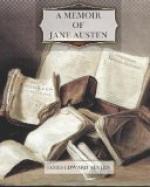As my subject carries me back about a hundred years, it will afford occasions for observing many changes gradually effected in the manners and habits of society, which I may think it worth while to mention. They may be little things, but time gives a certain importance even to trifles, as it imparts a peculiar flavour to wine. The most ordinary articles of domestic life are looked on with some interest, if they are brought to light after being long buried; and we feel a natural curiosity to know what was done and said by our forefathers, even though it may be nothing wiser or better than what we are daily doing or saying ourselves. Some of this generation may be little aware how many conveniences, now considered to be necessaries and matters of course, were unknown to their grandfathers and grandmothers. The lane between Deane and Steventon has long been as smooth as the best turnpike road; but when the family removed from the one residence to the other in 1771, it was a mere cart track, so cut up by deep ruts as to be impassable for a light carriage. Mrs. Austen, who was not then in strong health, performed the short journey on a feather-bed, placed upon some soft articles of furniture in the waggon which held their household goods. In those days it was not unusual to set men to work with shovel and pickaxe to fill up ruts and holes in roads seldom used by carriages, on such special occasions as a funeral or a wedding. Ignorance and coarseness of language also were still lingering even upon higher levels of society than might have been expected to retain such mists. About this time, a neighbouring squire, a man of many acres, referred the following difficulty to Mr. Austen’s decision: ’You know all about these sort of things. Do tell us. Is Paris in France, or France in Paris? for my wife has been disputing with me about it.’ The same gentleman, narrating some conversation which he had heard between the rector and his wife, represented the latter as beginning her reply to her husband with a round oath; and when his daughter called him to task, reminding him that Mrs. Austen never swore, he replied, ’Now, Betty, why do you pull me up for nothing? that’s neither here nor there; you know very well that’s only my way of telling the story.’ Attention has lately been called by a celebrated writer to the inferiority of the clergy to the laity of England two centuries ago. The charge no doubt is true, if the rural clergy are to be compared with that higher section of country gentlemen who went into parliament, and mixed in London society, and took the lead in their several counties; but it might be found less true if they were to be compared, as in all fairness they ought to be, with that lower section with whom they usually associated. The smaller landed proprietors, who seldom went farther from home than their county town, from the squire with his thousand acres to the yeoman who cultivated his hereditary property of one or two hundred, then formed a numerous




